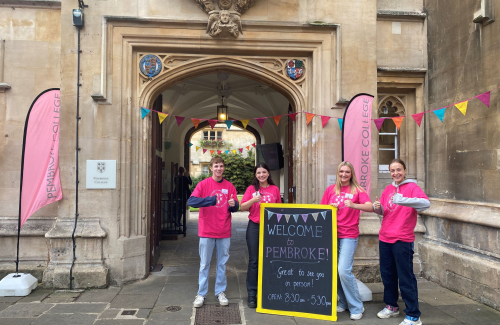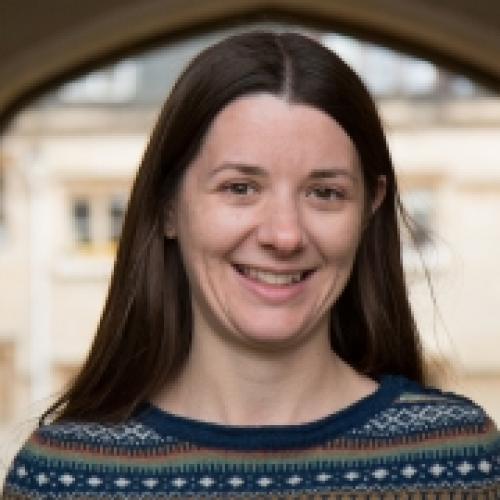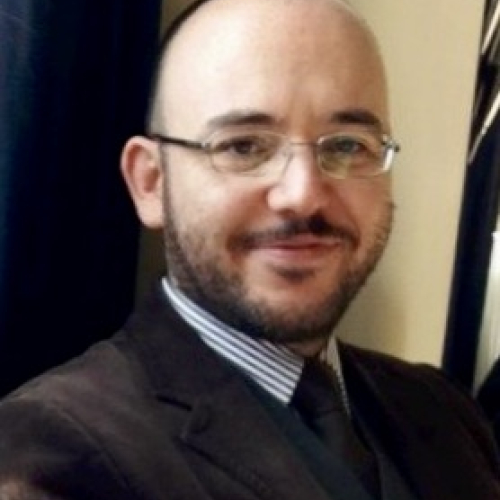Modern Languages and Linguistics
Why Choose Pembroke?
As well as having a tutor in Linguistics, Pembroke is one of the larger language colleges both in terms of tutors and students, and offers an unusually wide variety of languages and joint schools with Modern Languages.
In the study of Modern Languages we have Fellows in French and Italian and lecturers in German, Spanish, Portuguese, Modern Greek. Our key tutors in Modern Languages are Dr Tim Farrant, Tutorial Fellow in French with research interests in 19th century French literature and culture, and Professor Guido Bonsaver, Tutorial Fellow in Italian who specialises in modern Italian culture and, in particular, on the relationship between politics, film and literature.
At Pembroke we have a particularly strong focus on joint schools, including Modern Languages and Linguistics, in which our cross-disciplinary tutors work closely together to deliver a balanced and enriching academic experience.

Have you considered our other joint honours courses?
Both parts of this course are also available to take as part of other joint honours degrees, with options such as History and Modern Languages, English and Modern Languages, Modern and Middle Eastern Languages, Philosophy and Modern Languages and Psychology, Philosophy and Linguistics (PPL). Find out more about each of these on their respective course pages. Modern Languages is also available to take as a singular subject.
Meet Our Academics
Pembroke Modern Languages and Linguistics students are eligible for £100 of funding in their first year and another £100 in their final year towards the cost of books for their course for personal use. This is claimed from the librarian.
Currie Prize
-
The Currie Prize is worth approximately £300 and is awarded on tutors’ recommendation to the student giving the best performance in examinations.
Katie Prescott Scholarship
-
This scholarship, worth £300, is awarded on tutors’ recommendation to an undergraduate student in Modern Languages who achieves a Distinction in First Public Examination.
Christopher Pratt Prize (Spanish)
-
This Christopher Pratt Prize, worth approximately £200 per annum, is awarded on tutors’ recommendation to an undergraduate student reading Spanish who performs at the highest level.
Modern Languages and Linguistics
Why Choose Pembroke?
As well as having a tutor in Linguistics, Pembroke is one of the larger language colleges both in terms of tutors and students, and offers an unusually wide variety of languages and joint schools with Modern Languages.
In the study of Modern Languages we have Fellows in French and Italian and lecturers in German, Spanish, Portuguese, Modern Greek. Our key tutors in Modern Languages are Dr Tim Farrant, Tutorial Fellow in French with research interests in 19th century French literature and culture, and Professor Guido Bonsaver, Tutorial Fellow in Italian who specialises in modern Italian culture and, in particular, on the relationship between politics, film and literature.
At Pembroke we have a particularly strong focus on joint schools, including Modern Languages and Linguistics, in which our cross-disciplinary tutors work closely together to deliver a balanced and enriching academic experience.

Have you considered our other joint honours courses?
Both parts of this course are also available to take as part of other joint honours degrees, with options such as History and Modern Languages, English and Modern Languages, Modern and Middle Eastern Languages, Philosophy and Modern Languages and Psychology, Philosophy and Linguistics (PPL). Find out more about each of these on their respective course pages. Modern Languages is also available to take as a singular subject.
Meet Our Academics
Pembroke Modern Languages and Linguistics students are eligible for £100 of funding in their first year and another £100 in their final year towards the cost of books for their course for personal use. This is claimed from the librarian.
Currie Prize
-
The Currie Prize is worth approximately £300 and is awarded on tutors’ recommendation to the student giving the best performance in examinations.
Katie Prescott Scholarship
-
This scholarship, worth £300, is awarded on tutors’ recommendation to an undergraduate student in Modern Languages who achieves a Distinction in First Public Examination.
Christopher Pratt Prize (Spanish)
-
This Christopher Pratt Prize, worth approximately £200 per annum, is awarded on tutors’ recommendation to an undergraduate student reading Spanish who performs at the highest level.




